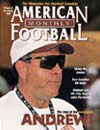Article CategoriesAFM Magazine
|
The LookJohn Parchman\'s stare gets his players attention, but it\'s his coaching that\'s turning him into a Texas football legend.by: Brent Schrotenboer © More from this issue Every Friday in the fall of 1998, John Parchman would watch a big offensive lineman walk through his office and a ritual would begin Parchman, a growing West Texas coaching legend, would look up from his desk at Robert E. Lee High School in Midland, give Rex Richards his famous look and ask the kid his famous question. "Rex," Parchman would say, "you ain't scared, are you?" "No sir," Richards would inevitably answer. "Good," Parchman would continue. "I guess we're going to have to deal the pain then." And so it went. Week after week and game after game, Parchman would needle Richards and his other players with his trademark look and tell them to act like men, deal with the pain and win games at the highest level of high school competition in football-crazy Texas. Parchman, 51, has turned the trick for yea....The full article can only be seen by subscribers.
|
|
|||||||
| HOME |
MAGAZINE |
SUBSCRIBE | ONLINE COLUMNISTS | COACHING VIDEOS |
Copyright 2025, AmericanFootballMonthly.com
All Rights Reserved





